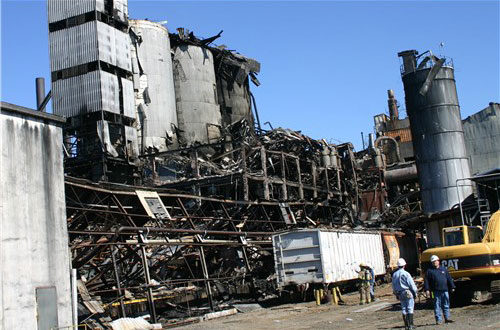Combustible dust still ‘critical issue in industrial safety’: CSB

Washington — The Chemical Safety Board is reiterating its call for OSHA to enact a comprehensive general industry standard for combustible dust – a potential hazard the board calls a “critical issue in industrial safety.”
“Combustible dust-fueled fires and explosions continue to injure and claim the lives of workers across a broad spectrum of industries, including food processing, oil production, fuel storage, waste treatment, and pulp and paper manufacturing,” a new fact sheet from CSB states.
“When the dust is confined, a powerful explosion can occur and propagate. Dust may accumulate on surfaces and lie undisturbed for years. Then an initial fire or explosion, known as a primary event, shakes it loose and it ignites. The resulting pressure wave travels through the plant and dislodges accumulated dust from the rafters, beams and equipment. This serves as the fuel for the secondary explosions. Most of the fatalities and the devastating injuries have been caused by these secondary dust explosions.”
CSB has been urging OSHA to issue a general industry standard for combustible dust since 2006. A board study conducted that year found that 281 dust-related incidents killed 119 workers and injured 718 between 1980 and 2005.
According to CSB, it has investigated five dust-related incidents – involving 27 fatalities and 61 injuries – since 2006.
The board recommends that OSHA guidance follow the structure of the National Fire Protection Agency’s voluntary combustible dust standard, NFPA 652. The standard states that as little as 1/32 of an inch of accumulated dust – comparable to the thickness of a dime – can trigger an explosion.
“That is why the NFPA recommends that companies control fugitive dust emissions, design facilities to prevent dust from migrating and accumulating, and perform rigorous housekeeping to remove any dust that does build up,” the fact sheet states.
Post a comment to this article
Safety+Health welcomes comments that promote respectful dialogue. Please stay on topic. Comments that contain personal attacks, profanity or abusive language – or those aggressively promoting products or services – will be removed. We reserve the right to determine which comments violate our comment policy. (Anonymous comments are welcome; merely skip the “name” field in the comment box. An email address is required but will not be included with your comment.)

